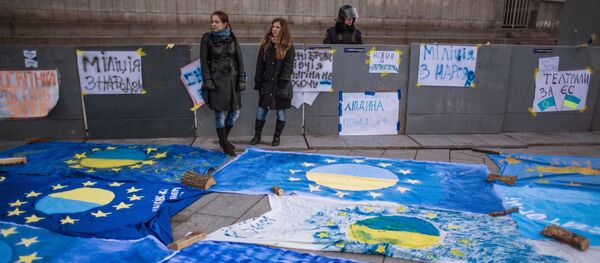According to the analyst, the core problem of the Ukrainian economy is "the ideologically driven choice to sever all ties with Russia, the country that has historically been its major trading partner and chief investor."
"In little over a year, living standards in Ukraine have fallen by half, the value of the currency has slumped by more than two-thirds, and inflation has skyrocketed to 43%. Yet, even as the economy has collapsed, the government has insisted on economic policies that can only be termed suicidal," Petro pointed out.
He noted that having cut ties with Russia in 2014, the Ukraine defensive and aviation industries have lost 80 percent of their incomes. By severing banking ties with Moscow, Kiev has denied itself investments and remittances from its migrant workers in Russia. In 2014, they sent back home $9 billion.
"This is not a policy that the west can endorse. Regardless of political sympathies, no western government should tolerate the deliberate impoverishment of the population for political gain. The risks of Ukraine becoming a failed state, and adding millions more to Europe’s burgeoning refugee crisis, are simply too high," the analyst wrote.
Western policymakers should insist that for Ukraine "economic rationality take precedence over economic nationalism," Petro concluded.
Amid the deepening political and economic turmoil, rumors are now multiplying day by day that the current Ukrainian government led by Western-backed Premier Arseniy Yaysenyuk will soon step down.
Earlier this week, The Financial Times reported that Ukrainian Finance Minister Natalya Jaresko was asked by both President Petro Poroshenko and Yatsenyuk to take the post later this year.
"Jaresko is liked by investors, but it is unlikely that one woman could guarantee any realistic structural reforms let alone go after the entrenched economic interests of Ukrainian oligarchs," an article in Forbes read.
Furthermore, Jaresko is unlikely to work with such a government which could jeopardize the support of Western creditors such as the International Monetary Fund (IMF) and the EU, Forbes reported citing people familiar with the matter.
At the same times, confidence is mounting among European policymakers that in its current state, Ukraine is far from being country member of the EU.
According to German journalist Theo Sommer, Ukraine was "forced to choose between the West and Russia" whose interests were not considered.
The West should agree on a compromise over Ukraine, including its integration to the EU and at the same the restoration of its "historic relations" with Russia, Sommer wrote.





